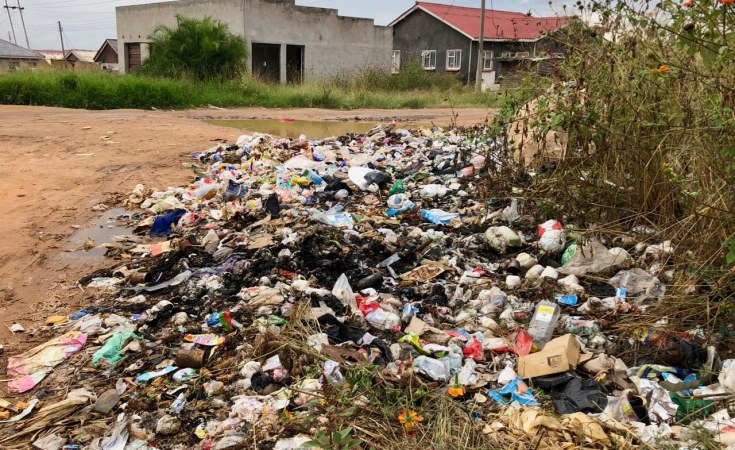A health time bomb is looming in Harare where the councils has failed to collect refuse in various suburbs.
The opposition dominated local authority has not been collecting waste from residential areas, giving rise to illegal dumpsites.
Residents are now living in fear of contracting diseases such cholera, typhoid and malaria as bacteria and mosquitoes take advantage of the breeding environment.
Swarms of both flies and mosquitoes, which are the vectors of the deadly cholera and malaria diseases, hover over dumped decomposing rubbish all day.
The incessant rains have exposed the city council's dereliction of duty on service delivery as the heaps of uncollected rubbish continue to pile on roadsides and open spaces.
Mosquitoes are now taking advantage of the heaped garbage with used baby diapers being part of he refuse dumped all over as residents try to reduce the piling rubbish from their homes.
Cholera is a bacterial disease usually spread through contaminated water and causes severe diarrhoea and dehydration. If left untreated, cholera can be fatal within hours, even in previously healthy people.
Illegal night vending has become the norm, especially in the after-hours exposing the city of Harare's ineptitude when it comes to law enforcement on the illicit practise.
Apart from uncollected refuse, the roads are marred with potholes which get wider as the rains persist and disturb the smooth flow of traffic, sometimes leading to congestion.
Residents have expressed concern over the poor service delivery by the councillors, pointing out the latter were living lavishly while neglecting the rate payers.
Some residents in other suburbs are pooling resources together to get garbage to dumping sites.
Some of the streets have been narrowed by the waste, inhibiting the smooth flow of traffic, especially in the high density suburbs like Budiriro, Glen View, Glen Norah, Highfield, among others.
Even medium and low density suburbs are not spared, especially Westgate, Southerton as well as Tynwald.
An elderly lady, Gogo Faustina Chimombe of Glen View thinks the 2018 plague might revisit the residents with devastating consequences, insisting Harare is Sunshine city no more.
"We are not safe because the Harare we used to know is no longer exists, we used to see the refuse trucks twice every week. It's now history, Glen View and Budiriro were the most affected during the outbreak of cholera sometime in 2018, and the same plague might revisit us anytime soon," said Gogo Chimombe.
Mr Herbert Nyadzo, a Southerton resident has since forgotten the last time he saw refuse trucks collecting rubbish.
"We last saw refuse collection trucks some time ago but we are not really sure when exactly, but way back but it did not collect anything since residents were even taken aback after a long period of no show," said Mr Nyadzo.
A commuter omnibus driver, Mr Talent Kapfumo complained that it was difficult to drive since most rubbish is dumped along the roads.
"Driving in residential areas is now a difficult thing since heaps of garbage are on the roadsides," said Mr Kapfumo
A resident from Westgate Ms Nicole Murahwa thinks an outbreak of cholera and other disease is a possibility.
"The challenge is affecting everyone in all areas, be it high density, medium as well as low density suburbs. No one is spared, the refuse is not collected and we are now living in fear of an outbreak of diseases," said Ms Murahwa.
Environmental Management Agency's environmental education and publicity manager Mrs Amkela Sidange said the challenge was real, adding they were coming up with a myriad of programmes to deal with the issue.
"Issues of waste management have become a recurring challenge, especially in towns -- affecting both major cities and small towns. As the custodians of the environment, we are seized with the challenges of poor management of waste," said Mrs Sidange.
"We are working closely with the local authorities in all towns so that we come up with a master plan to deal with such challenges. We are doing community engagements for a holistic approach to a plethora of ways like awareness campaigns," she said.
Mrs Sidange said recently they had a workshop for the same cause of engaging residents.
She challenged the local authorities to honour scheduled times for refuse collection to avoid dumping which threatens the environment.
"I can say the local authorities should play their role and follow a schedule in collecting refuse in urban areas. I also encourage residents not to dump the rubbish everywhere, don't throw it away and don't dump," she said.
Mrs Sidange also added, "We also have some scheduled roadshows as part of awareness campaigns."
Harare City Council (HCC) spokesperson Mr Innocent Ruwende said they had started door-to-door collections in some parts of Harare, adding they had a shortage of compactors for refuse collection.
"The city currently has an average fleet of 20 refuse compactors that are being deployed daily out of an ideal requirement of 40 refuse compactors. The city is currently collecting waste from domestic properties once in two weeks due to low fleet availability. The frequency will improve as the fleet improves," said Mr Ruwende.
He said the HCC was implanting a dump clearance in some parts of Harare using the newly acquired machinery.
"City took delivery of seven new tipper trucks and we are implementing a dump clearance. Currently the dump clearance programme is in Kuwadzana," he said.
"However, it must be noted that dumps are resurfacing as residents continue to illegally dump waste despite the city's efforts to constantly collect waste once in two weeks from residential areas," said Mr Ruwende.
He said the HCC was on a drain cleaning exercise.
"Council is currently carrying out a drain cleaning, catch pits cleaning, pipe drain deblocking and spoil removal exercise city wide. It is a recurrent routine exercise that is carried out throughout the year, primarily because of the behaviour of the general citizenry and vendors who have a tendency of using catch pits as litter pits," he said.


